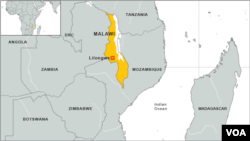Judiciary workers in Malawi ignored a government ultimatum to go back to work on Monday. Court employees have been striking since November 11, demanding a 45 percent pay raise - similar to that given to other civil servants. Lawyers, human rights groups and police say the strike is paralyzing the justice system, is unfair to defendants awaiting trial, and is causing jails to overflow.
Discussions between the government and worker representatives to resolve the issue are deadlocked. At recent talks in Lilongwe, the strikers rejected a government offer of a 30 percent salary increase.
A spokesperson for the judiciary workers, Linley Herbert, told VOA the issue is longstanding.
“In October [of last year] the government reviewed the salaries of the civil servants, but we were not included in that revision. Yet in 2012, we had an agreement that each time they are revising the salaries of the civil servants, [they will be increasing our salaries as well]. So, [after adhering to the agreement in 2013] we are surprised to see that this time we are left out,” said Herbert.
Meanwhile, prison and police officials are complaining of overcrowded cells. National police spokesperson Rhoda Manjolo told VOA that police are giving bail to those suspected of committing “minor offences” to ease congestion.
Malawi's Human Rights Commission says the strike is violating people’s rights to justice. It has asked the workers to end the nearly two month-long stalemate.
Attorney General Kalekeni Kaphale says the strike has no legal basis because it began before all channels of negotiations were exhausted. He also said the 2012 agreement between the government and judiciary workers on salary increments has no legal binding.
‘Putting the blame on us’
Herbert says blaming judiciary workers is unfair.
“I think everybody is putting the blame on us, but if you might look at it you can see that we are not wrong but the problem came with the government. At least if the government wrote us officially about something tangible, maybe as of now we couldn’t have been outside just sitting like this,” says Herbert.
The executive director for the Center for Human Rights and Rehabilitation, Timothy Mtambo, told a news conference last week that by failing to resolve the judicial strike, the government is compromising democracy.
“If the judiciary is paralyzed, which means an arm of government is paralyzed, and if an arm of government is paralyzed, we cannot talk of democracy because the primary responsibility [of the judiciary] is to make sure that there is access to justice and legal remedies. And that is totally shut down. So we are challenging the government that it’s only [a] dictatorship type of government that allows such things to happen,” said Mtambo.
‘No money’
Malawi President Peter Mutharika said in his recent state of the nation address that his government will not meet the strikers’ demands because of financial constraints. He said judiciary workers already receive higher salaries than colleagues elsewhere in the government.
“The gist of the strike is that those who have privileged salary scales want to continue to earn more than their mainstream civil servant colleagues. In short, they demand equal salary increments that will maintain their superiority over their mainstream civil servants. To do this means that we will have to have extra money from somewhere. There is just no money to increase their salary scales,” he said.
Mutharika said his administration is implementing a salary harmonization policy, which seeks to ensure that all government workers of equal grades receive equal salary, regardless of their departments.
"Does it make sense that a budget director or the accountant general, for example, should receive just about half the salary of his counterparts in the judiciary or in the national assembly?” asked Mutharika.
The government recently threatened to seal off the courts and withhold salaries for striking staff members if they failed to resume work by Monday.
But the strikers maintain they will not resume work unless the government meets their demands.





